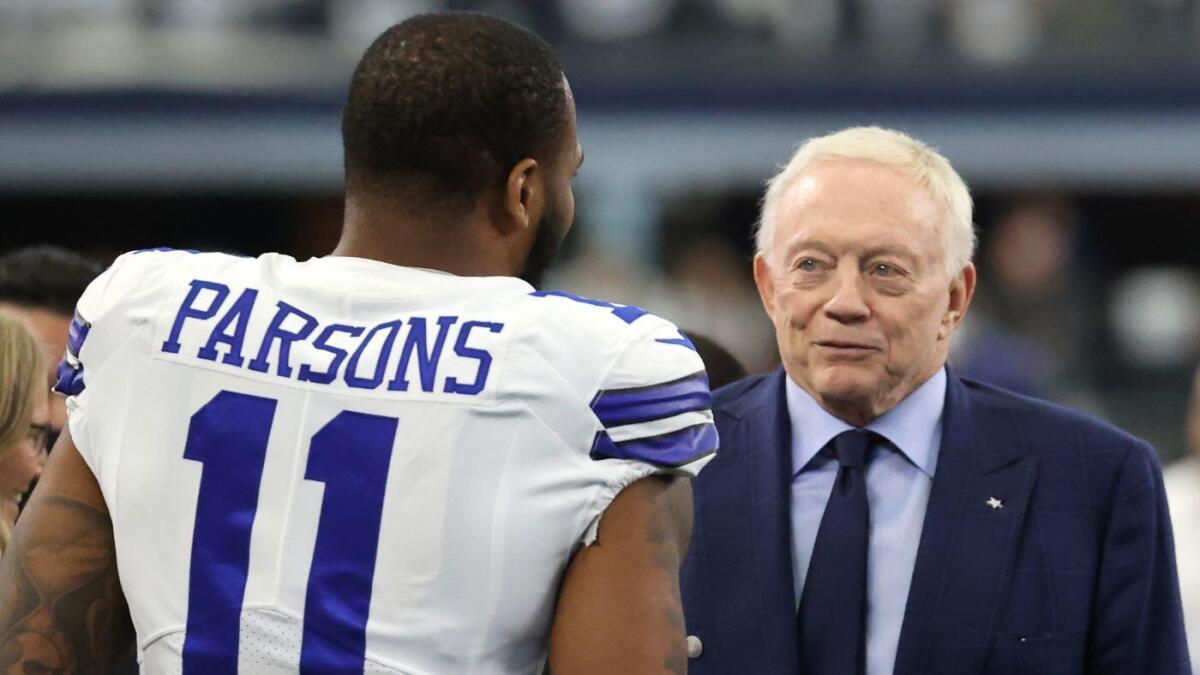The Complex Dynamics of NFL Training Camp: Analyzing Trade Demands of Terry McLaurin and Micah Parsons
Introduction: The Evolving Landscape of Player Empowerment
The 2025 NFL training camp has become a stage for significant player empowerment, with two prominent NFC East stars, Terry McLaurin of the Washington Commanders and Micah Parsons of the Dallas Cowboys, both demanding trades. While both situations revolve around contract disputes, the underlying motivations, leverage, and potential outcomes differ markedly. This report explores the intricacies of each case, examining the root causes, potential trade destinations, and the broader implications for their teams and the league.
Terry McLaurin’s Contract Standoff: A Battle for Market Value and Respect
The Core Issue: Compensation and Communication Breakdown
Terry McLaurin’s trade request is primarily driven by a prolonged contract dispute with the Washington Commanders. McLaurin, known for his exceptional route-running, reliable hands, and leadership, is seeking a contract that places him among the top-paid receivers in the NFL, potentially around $30 million per year. His frustration stems from a combination of factors, including a perceived lack of progress in negotiations and a breakdown in communication.
The Commanders have publicly expressed their desire to retain McLaurin, but the slow pace of negotiations and the apparent gap in valuation have eroded trust. McLaurin’s frustration is not just about the money but also about the lack of respect and recognition he feels from the organization.
McLaurin’s Leverage: Limited but Impactful
McLaurin’s leverage in this situation is somewhat limited. He is under contract, meaning the Commanders hold his rights and can refuse to trade him. However, keeping an unhappy star receiver can be detrimental to team morale and performance. McLaurin is the Commanders’ primary offensive weapon and a respected leader in the locker room. Losing him would leave a significant void in their offense and potentially hinder the development of their young quarterback.
Potential Landing Spots: Contenders in Need of a Wide Receiver
If the Commanders decide to explore trade options for McLaurin, several teams would likely be interested. The Kansas City Chiefs, following the departure of Tyreek Hill, could view McLaurin as a reliable target for Patrick Mahomes. The Green Bay Packers, seeking a consistent receiver for Aaron Rodgers, and the Los Angeles Chargers, looking to complement Keenan Allen, are also potential suitors. The Arizona Cardinals, despite being in the same conference, could consider a move if they are eager to bolster their receiving corps.
Micah Parsons’ Discontent: Beyond Financial Compensation
The Spark: Shattered Contract Records and Organizational Disconnect
Micah Parsons’ trade request from the Cowboys appears to be driven by a more complex set of factors than McLaurin’s contract dispute. While compensation is undoubtedly a component, Parsons’ discontent seems to stem from a deeper sense of unease with the Cowboys’ direction and his role within the organization.
Parsons’ decision to publicly request a trade reportedly came after seeing the record-breaking contracts signed by other edge rushers, such as Maxx Crosby and Myles Garrett. These deals likely reinforced Parsons’ belief that he is being undervalued by the Cowboys. However, beyond the financial aspect, Parsons has reportedly expressed frustration with the Cowboys’ defensive scheme and his usage within it. Some reports suggest he feels the Cowboys are not maximizing his unique skill set and that he could be even more impactful in a different system.
Parsons’ Leverage: Immense Talent and Market Demand
Parsons possesses significantly more leverage than McLaurin. He is widely regarded as one of the most dynamic and versatile defensive players in the NFL, capable of playing multiple positions and wreaking havoc on opposing offenses. His youth, talent, and marketability make him an incredibly valuable asset, and numerous teams would be willing to pay a premium to acquire his services.
Potential Landing Spots: Teams Willing to Build Around a Star
Given Parsons’ versatility and potential, any team would be lucky to have him. The teams that would be most interested in Parsons are likely to be those with strong coaching staffs and a clear vision for how to utilize his unique talents. The San Francisco 49ers, known for their innovative defensive schemes, and the Baltimore Ravens, with their strong defensive culture, are potential suitors. Even an intra-divisional trade to the Commanders, though highly unlikely, could be considered if they are willing to part with significant assets to acquire Parsons and build their defense around him.
Implications for the Commanders and Cowboys: A Crossroads Moment
Commanders: Retaining McLaurin is Crucial for Rebuild
For the Washington Commanders, losing McLaurin would be a devastating blow to their rebuilding efforts. He is the team’s most reliable offensive weapon and a key leader in the locker room. Trading him would send a negative message to the rest of the team and could further alienate the fan base. The Commanders must find a way to bridge the gap in negotiations and secure McLaurin’s long-term future in Washington.
Cowboys: Navigating Parsons’ Demands Without Capitulation
The Dallas Cowboys face a more complex dilemma with Parsons. While they cannot afford to lose a player of his caliber, they also cannot afford to set a precedent of caving to player demands. They must carefully navigate this situation to find a solution that addresses Parsons’ concerns while maintaining the integrity of their organizational structure.
Conclusion: A Reflection of the Modern NFL
The trade demands of Terry McLaurin and Micah Parsons reflect the evolving landscape of the modern NFL, where player empowerment and the pursuit of fair compensation are increasingly prevalent. These situations highlight the importance of open communication, proactive contract negotiations, and a willingness to adapt to the changing dynamics of the league. How these situations unfold will undoubtedly have a significant impact on the futures of both the Commanders and the Cowboys, as well as the broader NFL landscape. The league is witnessing a shift in power dynamics, where players are increasingly asserting their influence and demanding fair treatment. The outcomes of these trade demands will set precedents for future negotiations and player-team relationships, shaping the future of the NFL.











